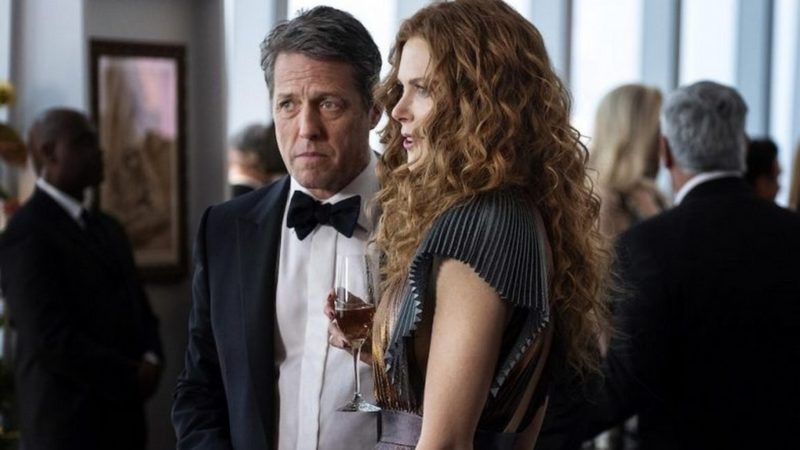Suspense Simmers, as Does the Class Conflict, in HBO's The Undoing
Premium cable has led to a quality transformation in David E. Kelley’s storytelling.

The Undoing. HBO. Sunday, October 25, 9 p.m.
Much has been made of all the big-name TV producers like Ryan Murphy and Shonda Rhimes who've left broadcast and basic cable networks for greener pastures among the streaming services like Netflix.
But the most amazing transformation of all has been that of David E. Kelley. Since freeing himself of network obsessions with Nielsen points, demos, and censors (yeah, they still exist, although your parents would probably find that hard to believe), he's turned out a string of intelligent and exciting suspense series unequaled by any another producer I can think of in the history of the medium. Mr. Mercedes (AT&T's now defunct Audience Network), Big Little Lies (HBO) and now The Undoing (debuting on HBO this weekend) have all been exquisitely written and acted, melding doubt, tension, wit and occasional outright terror into simmering pots of dread.
Kelley's latest, The Undoing (based on Jean Hanff Korelitz's 2014 novel You Should Have Known), is a murder story so full of plot twists and turns, so many characters shedding snakish skins, that it's nearly impossible to write about without scattering spoilers around like confetti. Yet in no way does it turn on plot gimmickry. It's about trust and relationships, authenticity and appearances, verisimilitude and veneers.
It starts off benignly enough. At one point, New York City power couple Grace and Jonathan Fraser (Nicole Kidman and Hugh Grant) are considering how much upheaval would result from leaving their posh Upper East Side apartment for the 'burbs.
"We don't have a lot of close friends," points out Grace, somewhat wistfully. Replies Jonathan: "It's only because we hate everyone." It's a joke that's not exactly a joke. Psychotherapist Grace's crowd includes avocational artists and lawyers, but their real professional interests are gossip, bitchery and, in at least one case, exhibitionist pride in what admittedly are an amazing pair of breasts. Pediatric oncologist Jonathan has plenty of young patients who worship him like a god, but his only adult male companion is purely circumstantial—a cold-as-marble father-in-law (Donald Sutherland) who from the moment they met has despised him as a poseur.
But for those few mostly invisible cracks, Grace and Jonathan's marriage seems a model of transcendent gentility—until the brutal murder of a parent at their teenage son's elite prep school flings a shower of legal and emotional shrapnel in all directions, shattering images and exposing secrets and stresses. Not the least of them is a nascent class resentment by the plebian masses who, though largely unseen, brush up against Grace and Jonathan's clubby little circle every day. When a cop intimates, without even a shred of evidence, that Grace is somehow lying about her entirely tangential relationship with the murder victim, the shock on her face moves him to bare populist fangs. "It's what rich, entitled people do when threatened," the cop sneers. "They conceal the truth … and they think they can get away with it because they're rich."
The cosseted delusions of the patrician upper-class is a theme to which Kelley returns again and again, in big ways and small. One starkly vicious little photographic vignette takes place at a fundraising auction at the prep school the Frasers' son attends. As the parents prattle about their pride in the school's diversity, the camera pulls back in a mini-version of the Atlanta crane shot in Gone with the Wind to reveal a crowd that's as white as a Klan rally in backwoods Mississippi, though considerably more Guccified. The photography in The Undoing, in the hands of British cinematographer Anthony Dod Mantle (Slumdog Millionaire), consistently explores the geometries of upscale Manhattan and ravaged Harlem to telling effect.
As remarkable as the photography are its two principal subjects, Grant and and Kidman. Whether it's the product of his makeup crew or the 60 years since his birth, the boyish handsomeness that marked his film performances well into middle age is nowhere on display in The Undoing. It seems to have curdled on his face—which is also what happens to his famous charm as the plot batters away.
Yet whatever deal Nicole Kidman has struck with the underworld is, happily, holding fine; she is even more gorgeous at 53 than in her earliest performances three decades ago. Her beauty is a perfect match for her character, outwardly perfect, inwardly clueless, a kind of post-feminist version of the role she played in the remake of The Stepford Wives, in which she famously proclaimed, "This place does something to people—all of the women are always busy and perfect and smiling, and all of the men are always happy." Until they're not.


Show Comments (25)